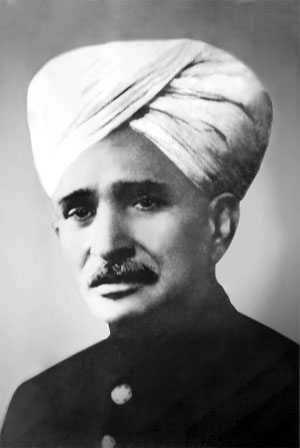KC Yadav
Much is found in print on Sir Chhotu Ram. Some misunderstandings, albeit briefly, can be removed with the help of a contemporary who had close contact with Sir Chhotu Ram. He was SK Kirpalani, a senior ICS officer, known for his integrity, pluck and detachment.
It was the ‘Provincial Autonomy’ era. Chhotu Ram was the Development Minister in Sir Sikandar’s ministry. Kirpalani was Finance Secretary to the Punjab Government and was attached with Chhotu Ram. Some of his friends, who knew Chhotu Ram well, advised him to be careful, for the minister hated urban Hindus that he was. Kirpalani was, obviously, a little confused. One evening, he gathered courage, and went to Chhotu Ram’s residence. He was received, he says, ‘courteously and correctly’. Without going into any formality, he unburdened his mind; sharing with the minister all that his friends had said, and he politely inquired whether he would like him, an urban Hindu, to work with him. Chhotu Ram replied: “Mr Secretary, I am concerned with policies and not with individuals. I am not against urban Hindus. So long as your personal administration does not thwart my policy orders, you need have no concern”. Kirpalani worked with him for four years.
Chhotu Ram was a man of exceptionally strong moral caliber. He was always ‘polite and correct’ with those he worked with, but he would not hesitate 'to be curt and abrupt if the occasion so demanded'. A senior British officer once recommended the case of his countryman for promotion, ‘ignoring the just claim of an Indian’. Chhotu Ram noted on the file: “It stinks”. The officer was upset and furious, and shot back: “Respectfully, I must protest against the reflection”. Chhotu Ram again noted on the file, “The case stinks all the same. If the officer so desires, I shall elaborate in writing. If he wishes to hear in person, I am ready to speak”. The officer discussed with the minister, “came out crestfallen. The Indian who deserved the post got it”.
No one ever dared to influence Chhotu Ram or approach him for a favour. Nor did he seek favour from anybody. Once Chhotu Ram's wife asked Kirpalani privately to help her son-in-law who held a petty post in the Revenue Department in Patiala state. He knew the Prime Minister of Patiala, says Kirpalani, “and casually mentioned the case”. The lad got modest promotion. Chhotu Ram got to know of this and was boiling mad at me. I protested that after all I had asked for consideration on merit. He spoke gravely: “Your word is not without influence. I think you should understand my approach to these matters. When I became a minister, I took a vow, I would never forget my political friends, be they as humble. At the same time, I made an axiom of conduct that I would never help my relatives, close or remote, to find employment with government or private industry. Nepotism is not a matter of degree. It is a question of approach. If anyone ever points the finger of reproach at me on that score, however disguised the question, I shall have no option but to quit politics”.
Chhotu Ram was born poor. He never ever lived like a rich man even when he was a minister and had got ‘murrabbas’. He retained, says Kirpalani, “one-fifth of his salary for expenses, and gave the rest to the endowment of Jat Heroes Memorial High School in his home town Rohtak. He built a modest house in the suburb of Lahore, and furnished it still more modestly. His wardrobe was bare as it would be”.
(The writer is a historian based in Gurugram)









